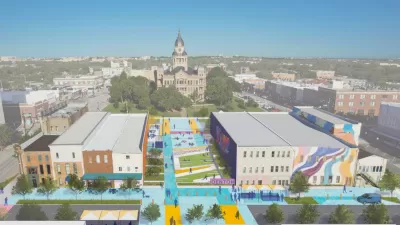The smart phones that keep us constantly connected to cyberspace may have detrimental effects on our public spaces, writes Emily Badger.
Remember the flip-phone glory days of just five years ago, when people in public spaces would make eye contact, ask for directions, or even say a friendly hello when passing by. Those days seem long gone, as smartphone use has created "portable private personal territories," in which fellow pedestrians are much more likely to be engrossed in checking their phones to see the new Facebook or Twitter update, read email, or send a text.
The change in mobile technology has prompted Tali Hatuka and Eran Toch from Tel Aviv University to study how phone users view their devices - and how they feel about the behavior of others. They've found that "Smart-phone users, for starters, are much more commonly under the illusion that they have privacy even when walking down a public sidewalk. They're less skittish about having personal conversations in public. They're more detached from their physical surroundings."
As smart phone users retreat into their own private spheres, public spaces suffer, notes Badger. "This is not a good thing. The public sphere plays an important role in our communities: it's where we observe and learn to interact with people who are different from us, or, as academics put it, it's where we come to know 'the other.'"
"The communication of strangers was always one of the key roles of public spaces, observing and exchanging with the other. Because smart phones are supplying so many of these services, this kind of exchange with the stranger is just diminished to almost zero," observes Hatuka. Although she has not found the answer to resolving this change in behavior, she recommends that technology, ironically, may be the very tool to help keep the "public" in the public sphere.
FULL STORY: How Smart Phones Are Turning Our Public Places Into Private Ones

Maui's Vacation Rental Debate Turns Ugly
Verbal attacks, misinformation campaigns and fistfights plague a high-stakes debate to convert thousands of vacation rentals into long-term housing.

Planetizen Federal Action Tracker
A weekly monitor of how Trump’s orders and actions are impacting planners and planning in America.

In Urban Planning, AI Prompting Could be the New Design Thinking
Creativity has long been key to great urban design. What if we see AI as our new creative partner?

King County Supportive Housing Program Offers Hope for Unhoused Residents
The county is taking a ‘Housing First’ approach that prioritizes getting people into housing, then offering wraparound supportive services.

Researchers Use AI to Get Clearer Picture of US Housing
Analysts are using artificial intelligence to supercharge their research by allowing them to comb through data faster. Though these AI tools can be error prone, they save time and housing researchers are optimistic about the future.

Making Shared Micromobility More Inclusive
Cities and shared mobility system operators can do more to include people with disabilities in planning and operations, per a new report.
Urban Design for Planners 1: Software Tools
This six-course series explores essential urban design concepts using open source software and equips planners with the tools they need to participate fully in the urban design process.
Planning for Universal Design
Learn the tools for implementing Universal Design in planning regulations.
planning NEXT
Appalachian Highlands Housing Partners
Mpact (founded as Rail~Volution)
City of Camden Redevelopment Agency
City of Astoria
City of Portland
City of Laramie




























